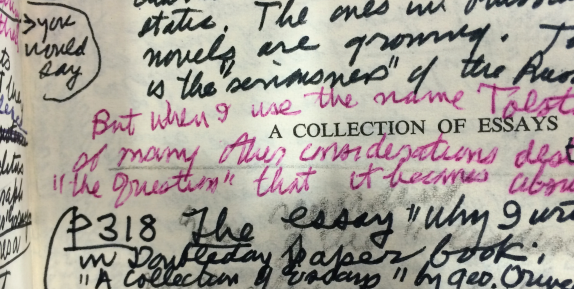A Collection of Essays
by Ander Monson
Reflection on “A Collection of Essays”
The page has always been as dynamic as we’ve let it be. It’s an artifact, of course, and its artifacty properties have become more obvious in the age of the digital. But artifacts like this are hardly fixed. As any reader knows, when we read or handle a printed page, we degrade it, if just a little. If not why would special collections require us to put on the creepy gloves? Why do our paperbacks wear out and the spines on our books crack and the places where we dogear pages slowly wear away?
What I found after I finished my experiment with Vanishing Point (2010) in trying to marry the print and digital was that I could not get myself to love electronic books. I couldn’t handle pdfs because I couldn’t handle pdfs. It took me a while to figure out that intimacy was the thing I missed: to know that my reading left a mark. So I started collecting marks and writing back to them in libraries for the next six years. For the rest of my life, really, since this has become a practice that I cannot seem to stop.
To know that by my using a page I aid erosion means more to me. That it is not static. Oh I know that the digital won’t necessarily last either. That it’s vulnerable to static shock, to DDoS, to being lost on diskettes or in formats we can’t even read anymore, even if the media itself did not also fail. But it doesn’t degrade in ways that increase intimacy.
Ken McAllister and Judd Ruggill operate the Learning Games Initiative Research Archive, a repository of electronic games and their paraphernalia and the machines necessary to play them. The place, hidden up in the Transitional Office Building on the outskirts of the campus, is dedicated to trying to preserve the kinetic by design, but with a twist:
Deep human memory of the archive’s artifacts can be both more timeless and more accurate than less experiential forms of study. Memory, particularly when its contents are shared widely and deeply, is far more durable than what most game-related artifacts are constructed from: cheap papers, unstable plastics and chemicals, sloppy circuits, and other materials designed to turn a quick buck and then be guiltlessly supplanted. For this combination of reasons, the LGIRA mantra is not use rather than preservation, but use as preservation.
They’re talking games of course, which, unlike books, are not built to last, but still: by using, knowing that we risk using up, we increase the value of what we do. Which has always been the case with pages. Perhaps that is another feature, along with the metaphor of “page,” that these digital simulacra might adopt.
ANDER MONSON is the author of six books of poetry, nonfiction, and fiction, as well as the editor or curator of a number of other literary projects including Essay Daily, March Xness, DIAGRAM, and the New Michigan Press. He directs the MFA program at the University of Arizona.
